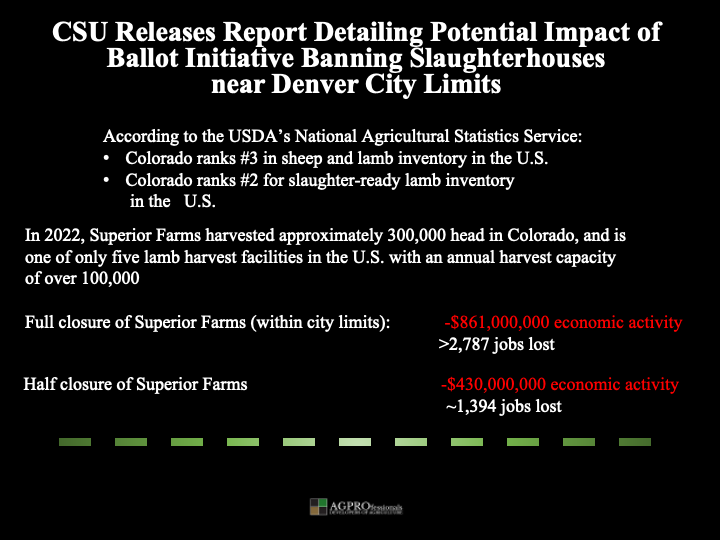From an article in Western Livestock Journal
By Charles Wallace, WLJ contributing editor
Jun 7, 2024 Updated Jun 14, 2024
Colorado State University (CSU) released a report detailing the potential economic impact of the November ballot initiative prohibiting slaughterhouses within the city limits of Denver, CO, which would significantly impact the local economy and the livelihoods of many.
If passed, the “Prohibition of Slaughterhouses” ordinance would prevent the “construction, maintenance, or use of slaughterhouses within the City” beginning Jan. 1, 2026. It would also provide residents affected by the ban “workforce training and employment assistance programs.”
The study looked at the impact on the economy and the Superior Farms lamb processing facility, which operates in Denver and accounts for 15-20% of the total lamb harvest capacity in the U.S. Founded in 1964, Superior Farms is an employee-owned company that provides 160 jobs. Nearly 80% of these employee-owners are residents of Denver.
According to USDA’s National Agricultural Statistics Service, Colorado currently has the third-largest sheep and lamb inventory in the U.S. It ranks second nationally, behind California, for slaughter-ready lamb inventory. In total, 21 USDA-inspected sheep and lamb slaughter plants operate in Colorado, with a capacity of 400,000 head in 2022.
Of these federally inspected facilities, only two—Superior Farms and Colorado Lamb Processors—have a capacity exceeding 100,000 head per year. In 2022, Superior Farms harvested approximately 300,000 head in Colorado, and is one of only five lamb harvest facilities in the U.S. with an annual harvest capacity of over 100,000 head.
The study looked at three scenarios of the possible outcomes should the ordinance pass:
• Scenario 1: Livestock harvest operations in Denver County do not relocate to other areas within the state and ultimately leave Colorado.
• Scenario 2: Half of the lost economic activity is retained within Colorado by relocating operations, such as shifting lamb slaughter to an existing plant in Morgan County.
• Scenario 3: Eighty percent of Denver’s lost economic activity is retained elsewhere in Colorado.
In the first scenario, the closure of Denver-based processing operations results in a reduction of over $861 million in economic activity and the loss of more than 2,787 jobs. If If half of the Denver-area slaughter activity relocates to other parts of Colorado, there would be a loss of over $430 million in economic activity and a reduction of 1,394 jobs. In scenario three, if processing in the state expands to 80%, the state would still lose 697 jobs and over $215 million in economic activity.
The study said the losses would affect various sectors, including animal production, animal food manufacturing, support activities for agriculture and forestry, grain farming, truck transportation and wholesale sectors like grocery. The estimates represent a snapshot in time and do not account for cumulative effects over multiple years. Consumers, buyers and suppliers may adjust their behavior by turning to alternatives such as imported lamb if local markets become unavailable.
“Arguably, the increased costs and risks to lamb producers would impose a significant strain on a stressed industry,” the authors wrote. “In short, any additional reduction to slaughter capacity in the United States would accelerate the lost market share and further reduce the lamb inventory in the U.S., while also increasing dependency on imports.”
The study asserts that the ordinance runs counterintuitively to consumer preferences as there is a growing interest by Colorado consumers in purchasing locally raised products, citing a survey by the Colorado Public Attitudes Survey. The study notes that consumer demand for lamb has expanded, it holds significance in various ethnic markets and cuisines, and the ban is expected to raise prices and diminish the accessibility of lamb in these markets.
Industry reaction
Bonnie Brown-Eddy, executive director of the Colorado Wool Growers Association, told WLJ they appreciate CSU showing the impacts to the industry and said it will adversely affect processing and small family operations.
“The study focuses on the impacts of the Denver area, but we all know this will have a nationwide impact if it passes,” Brown-Eddy said. “Concentration in the packing industry has been an issue for years, and knocking out a major packer under the guise of ‘animal welfare’ sets a precedent for animal activists to attack the supply chain in other states further reducing producer’s options to market their livestock.”
Brown-Eddy continued, “Superior Farms is the largest purveyor of American lamb from small family farms in Colorado and across the U.S. There is no buyout provision in the ballot language, the business is just expected to absorb the loss of a multi-million-dollar business closure.”
Brown-Eddy said building a new processing plant takes years, and in the interim, the lamb industry would lose its customer base and the marketplace void would be filled with imported products, further harming U.S. producers. Brown-Eddy encouraged people to donate to the “Stop the Ban. Protect Jobs.” campaign at stopthebanprotectjobs.com to help defeat the measure.
The Colorado Livestock Association (CLA) pledged $50,000 to fight the ordinance, stating it unfairly targets Superior Farms and will negatively impact the agriculture industry. CLA said that passing the ordinance would establish a precedent that jeopardizes millions of dollars in the state’s other commerce associated with meat production.
“This study shows that the ban not only eliminates 170 jobs at the employee-owned plant in Denver, but it also threatens thousands of other related jobs across the state,” Zach Riley, CEO of CLA, said.
Link HERE

